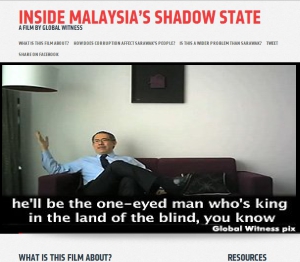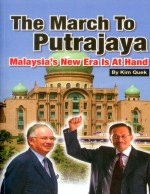By Bunga Pakma

Malaysiakini has turned ten. Every Malaysian netizen knows well just how much we all owe Steven Gan, Premesh Chandran, and all their colleagues. Before M’siakini we were a people walking in darkness—I prophesy that history will one day reveal many, many dread deeds that never made it into print, when print was all we had. M’siakini was the first light that dawned on us. Let the light rise and shine bright!
This evening a whole bunch of good people will sit down to dinner and celebrate. It’s a chance for loyal subscribers— a paper is only as good as its readers—to feel good about themselves, too. My piece today pays tribute to M’siakini and all brave writers.
The pen is mightier than the sword? In one sense, absolutely. Has anyone ever drawn a sword, picked up a rock, hurled a fist—or a bomb—without plenty of words having prepared the way? I am not referring to propaganda. Books have started wars. Hitler laid out his entire programme clearly in Mein Kampf and the book convinced enough Germans that the Nazi party and unlimited aggression were good things.

At the opposite pole, in 1852 the American writer Harriet Beecher Stowe published a novel, Uncle Tom’s Cabin. Her theme was the evil, cruelty, and immorality of slavery at the time. The book sold in millions all over the world. In the US, the debate raised by the book turned into sharp opposition between North and South. The country split, and the two sides fought one another. When Abraham Lincoln was introduced to Stowe, he is quoted as having said: “So you’re the little woman who wrote the book that made this great war!”
Words themselves are weapons. If you dare, walk into a place-of-worship/pub/restaurant and shout “Filthy [insert race/religion/football club here]!” and see what happens.
Can a pen force the sword to be laid down? Once in history, yes. To see this we must go back exactly 300 years, to the birth of modern party-politics in England. Bear with me, patient reader. I think your knowing the origin of things will help you understand how they work now.
European politics in the 17th and 18th centuries were as complex and cruel as ours, but they were on a grand scale, not the sneaking things we suffer. Those times saw war and revolution.
Louis XIV, king of France, the most powerful nation on the Continent, waged war without stop in the latter years of his reign. Flanders in modern Belgium was a major theatre of operations in Louis’s attempt to secure a favourable and strong eastern border for France against republican (think “communist”) Holland. England remained neutral, or vaguely allied with France, under kings Charles II and James II. Then in 1688 the English overthrew James and invited the Dutch Stadtholder William III—husband of James’s daughter Mary—to be king. One important result of this “Glorious Revolution” was the establishment of a Bill of Rights, which limited the constitutional role of the monarch once and for all.

William and Louis were sworn enemies, and William—irredeemably Dutch—used England’s wealth and military to fight France, on a greatly expanded number of fronts, including North America. William borrowed money on a grand scale to finance his wars. William never intended to repay the principal, and the interest was to be serviced by perpetual taxation.
First step to modern politics—the creation of a a National Debt. Ever since, Parliament has suffered the yearly bellyache of keeping the state from going bankrupt. All nations have adopted the same policy.
The burden of taxation fell heavily on owners of land, and hardly at all on the merchants and financial interest.
Second step to modern politics: the two opposed interests coalesced to form two opposed political parties, one party in power, with another party trying to dislodge it and take power itself. The land-interest was called “Tory” and the money-interest “Whig.”
All was in place now for the sudden flowering of modern parliamentary politics, features not ordained by the Constitution but a kind of extra constitution with rules just as rigid. The king once rewarded service done for him. Now the party rewarded service done for it, and patronage was born. The Englishmen of the early 18th century, acute rhetoricians, developed the machinery of publicity and propaganda and refined it into subtle and powerful tool to influence public opinion with all the craft of “spin.”
William’s wars were no problem to the Whigs; they were making plenty of money out of it. The Whigs stayed in power, even after William died and Anne succeeded. The conflict with France had now morphed to a struggle over whether Louis’s grandson was to inherit the kingship of Spain. Meanwhile the Tories fretted in the Opposition and party strife raged. Everything was politicized, even poetry. France haemorrhaged blood, and England money.
Now another first in the young story of party-politics, i.e unexpected change: 1) By 1710, the situation had shifted radically, leaving little reason for England to fight. 2) The Whigs after so long in power, had become sloppy and arrogant, demanding that they alone dictate the terms of any settlement of the war. 3) The Duke of Marlborough, commander-in-chief, and his wife the Duchess alienated the Queen with their arrogance. The Duke was widely rumoured to have received hundreds of thousands of pounds in kickbacks from contractors to the army. Anne dismissed the Whigs—it was still her prerogative as Queen—and asked the Tories to form a cabinet, and the general election brought in a handsome Tory majority in the Commons. Anne saw to it that Lords went Tory, too.
The new ministry’s top priority was to make peace with France. Negotiations were immediately opened in secret with Louis. Yet after decades of war with France much of the public had been trained to hate France with all the venom that patriotism can instill. How to reconcile them?

An Irish clergyman was in town on church business to the Queen. He had been trained in diplomacy and was known (to a few) as a writer of extraordinary powers. This was Dr. Jonathan Swift. (Gulliver’s Travels were 20 years in the future.) Swift had to meet Harley, the Secretary of State, on his way to the Queen. Harley liked Swift for his manners, his charm, learning, and wit, and saw that Swift’s talents could be of great use. Within a few months, Swift was unofficial member of the cabinet with the portfolio of Minister of Information (if such a post had existed then). He was given unlimited access to all state papers.
Swift wrote, and in November 1711 an anonymous booklet was published, The Conduct of the Allies. In cool, rational prose, the book recounted, with accurate figures, the expenses of the war, the profits made out of it, the way the Allies (Holland and Austria) had let England take the burden of expense while using English might to further their own interests. The Conduct sold in numbers never before seen. The public came around, and a peace was signed in Utrecht early 1713. Swift’s pamphlet had bought England, and Europe, a few decades of rest from war. Swift never took a penny from the government for his work.
Later, exiled (he felt) in Ireland, Swift saved the Irish people from a private monetary scheme supported by the now Whig administration—run by a Prime Minister, another first—that would have caused financial collapse and immense suffering. The government put a price on his head, but no one betrayed his name as the authour of the pamphlets. Thereafter every November 30th the Dubliners celebrated his birthday with bonfires.
It is strange that Swift was witness to another feature of modernity, political assassination. Rather, attempted assassination. One day, a messenger delivered a box tied with string to the cabinet room. Swift, sensing mischief, asked to see the box. He carefully cut the string just enough to see what was contained, a crude explosive device. With great care, he disarmed it. Not bad for a writer, eh?
Swift is a hero, certainly my hero, and I should hope a hero to any journalist and writer. Swift speaks to us from his epitaph in Dublin Cathedral:
“Go, traveller, and imitate—if you can—him who defended liberty with courage as a man must.”
Happy birthday, Malaysiakini!






















Dear Bunga Pakma
I must thank sincerely BFM 89.9 for interviewing Mr Premesh Chandran, the co-founder of Mkini, and as i was googling him, i landed on this great masterpiece.
May i lift a story from this post of yours on Dr. Jonathan Swift, please.
Thank you and warm regards
Comment by Fi-sha — February 19, 2010 @ 9:12 AM |
SKY asked 5 years ago whether Mkini can survive another 5 years in one of his article in Mkini. And we cheer the moment when we celebrate his question with a resounding YES!
And the question renews, another 10 years, and many more.
Comment by Liumx — November 28, 2009 @ 11:35 AM |
Malaysiakini’s co-founders and people like SKY didn’t have to deal with the threats faced by journalists in the Philippines, but they have been brave nonetheless.
They have played their part in putting to rest the old mantra, “Why try to publish the truth? Nothing ever changes. What’s the point?” etc.
They made a difference and Malaysians now realise political change IS possible. See “ISA and the panopticon: the anatomy of fear”. https://hornbillunleashed.wordpress.com/2009/06/11/1803/
Happy Birthday Malaysiakini, many happy – and fearless – returns.
Comment by Pak Bui — November 28, 2009 @ 10:02 AM |